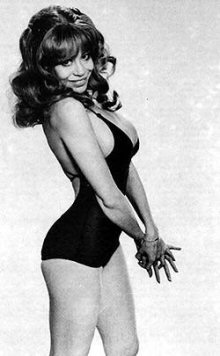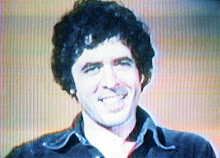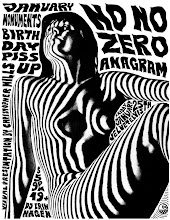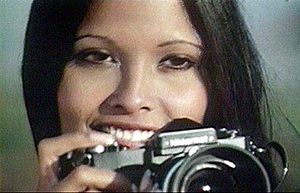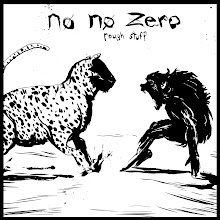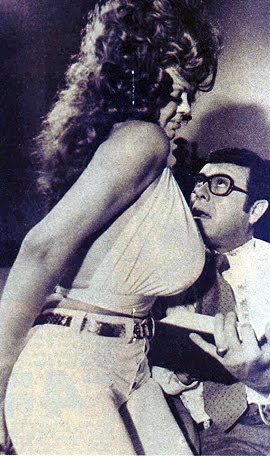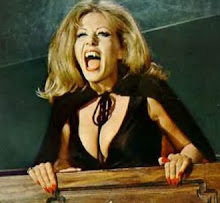Tuesday 4 December 2012
Tuesday 27 November 2012
Tuesday 20 November 2012
Dinner With The Pain Teens!
This coming weekend, I'm not only turning 40 (!) but I'm going to miss the reunion of one of my very all-time favourite bands: The Pain Teens (playing their home state of Texas, as part of a Trance Syndicate Reunion Fest). So that really sucks.
Still, if I can't do anything about my ongoing decrepitude, I can at least post an interview I did with The Pain Teens -- nearly two decades ago now -- at their one and only Toronto show (playing Lee's Palace with Fudge Tunnel), touring behind the quite excellent penultimate album, Destroy Me, Lover.
Reading the Q&A back, I'm embarrassed now by what seems to be the 'devil's advocate' approach to my questions; I sound like a conservative jerk taking the band to task for various perceived wrongs. Mea culpa, I don't know what else to say. I was young.
The Pain Teens were guitarist/loop magician Scott Ayers and mostly-singer Bliss Blood, along with (now deceased) bass player Kirk Carr and drummer Frank Garymartin. I approached Scott after soundcheck to see if an interview was possible, he agreed, and I sat down with the whole band over dinner in a nearby restaurant before the show. Frank was there too, he just didn't say anything.
The date of the interview was September 29, 1993; a month or so later, The Pain Teens' tour ended, Scott and Bliss dropped Kirk and Frank from the band, went on to release Beast Of Dreams as a duo, and then split up. Until this coming weekend, that is. *sob*
Canada is a neighbour to the U.S., and we therefore get a different view of the U.S. than you would. I was thinking about that because this is your first trip here. We read in the papers a lot about American (news), and it really seems like the States is really going down in every possible way.
(Scott laughs)
I just wondered what you thought about that?
Scott: Well, the U.S. is really weird. There's a lot of culture clash, and there's a lot of, I don't know...
Bliss: Racial war, man. It's basically a civil war. It's unofficial, but, you know, there's a show they show in Houston every night called "City Under Siege" that's drug dealers being caught--
Scott: It's like every day the drug busts and the murderers and everything... that happens every day. In Houston, there's an average of about two or three murders every day. Every day for the whole year averages out to that. Some days there might be, like, ten in one day. It's a really incredibly violent society. And everyone packs guns and stuff.
How does that affect people?
Scott: Makes people real jumpy.
Bliss: Paranoid.
Scott: Makes them a little nervous about going out on the street. Car-jacking is the latest phenomenon. People run up with a gun, "get out of your car", you know?
Do you think people feel, by and large - doomed is a pretty strong word - but that things aren't going to get any better? They're only going to get worse? Do you think Clinton getting elected changed anything?
Scott: I think it did. I think it helped. We've had, like, twelve years of the Reagan-kinda thing--
Bliss: Fascist regime (laughs).
Scott: I think it could get better.
What do you think could be done to reverse the decline?
Bliss: Gun control.
Scott: Health care.
Bliss: Education.
Scott: Stuff like that. In Canada, people probably consider it their inalienable rights for health care and education. In the U.S.--
Bliss: It's all divided as to who has the money. The rich, who can afford to pay for good health care... if you're rich, you can afford to put your kid in a private school and get an education.
Scott: Even the legal system.
Bliss: Right. It's the rich who can get a good lawyer.
THE PAIN TEENS have always struck me as an easily misunderstood band.
Bliss: Hmm, I'll say!
What is the biggest misconception about you guys?
Bliss: That we're an S&M, bondage band.
Scott: Or that we're really...no sense of humour or no fun, you know?
Bliss: Yeah, people just don't know black humour when they hear it.
Scott: It's cynical black humour is what it is. A lot of it.
Have you guys heard of SKINNY PUPPY? (They nod). I was just re-reading an interview with them where they were saying that they're reflective of the environment. Like, they kind of get the same tag you guys get of being really dark. But they were saying that's because the world is that way, and if things got better, they'd be ambient or something.
Bliss: Right. Your outlook would improve.
Right. Do you see THE PAIN TEENS anything like that?
Bliss: Definitely.
Scott: I see us as more of a... (trails off). To me personally, we sort of reflect media a lot. Because this is the age of media manipulation. And a lot of people don't see it that way but... maybe we're more reflective of media than of society in general.
Bliss: Well, media's a reflection of society too.
Scott: To a degree. But it takes on its own character also.
How would you define the American media? Repressed?
Scott: It's hard to define. Basically sensationalist. It's repressed in a way, but the repression leads it to come out in other ways. Like, for example, they can't show a breast or something like that in advertising or TV, but everything else--
Bliss: They'll show somebody with a bloody gunshot wound on the way to the hospital.
Scott: But another thing is sexuality is so... it's just like brimming over the top in everything, you know? All the commercials and stuff. It never shows it but it's there constantly because of that.
Kirk: If you use this product, you'll get laid.
Bliss: (laughing) Yeah, make your jimmy thicker, get your girl in the mood quicker. That ad Ice Cube did for malt liquor.
I heard about that, yeah. I didn't really want to harp on the fact that you're from Austin. I don't know if that-
Bliss: We're not!
Scott: We're actually from Houston.
Oh, sorry. Well, there you go.
Scott: There's a big difference.
Kirk: Yeah, don't be saying that Austin shit, man. Those motherfuckers.
Bliss: Yeah, we find that offensive. Those hippie slackers.
Scott: Houston is about twenty times the population of Austin.
Bliss: And we're twenty times meaner.
Scott: Houston's a huge city. It's, like, four million in the metropolitan area.
Wow. That's twice as big as Toronto.
Kirk: Spread out really far.
Scott: Yeah. It seems a lot like Toronto in that it's really large and spread out.
Do you think that's relevant to you - as a band - that you're from there?
Scott: I think it is. Because, ah... it has much more of a kind of international air to it in a way.
In the one (package) you sent me, there was mention of touring with (ZENI GEVA), and a lot of your music does sound like it comes from - I don't know if this'll sound stupid - but a really industrial place or a really repressed society, like Japan.
Scott: It is a really industrial city, yeah. It's based around the oil industry. In fact, it used to be known as "Baghdad On The Bayou" (laughs).
(also laughing) I want to talk about a few songs on the new album. The first one would be "Cool Your Power" -- a few of the reviews I have read of the album talk about how it's so catchy, and almost like a poppy song. Were you conscious of that?
Scott: Kinda, in a jokey sort of way.
I wondered if it might be kind of satirical?
Scott: A little satirical, yeah.
It is really catchy, which is kind of strange.
Bliss: Scott learned how to make a hook.
Well, you guys have that every once in awhile. Like, I thought "Shallow Hole" was kind of the same. And "Bannoy". You know, they're catchy songs - but it's really rare on your albums. The lyrics seem to be about a woman wanting a powerful man so that she may (also) be powerful. Would that be a correct assessment?
Bliss: Well, she's already powerful. She just wants a man as powerful as she is, instead of a weakling.
I figured she was taking a bit off him.
Bliss: Well, every woman wants a man that's bigger and stronger than she is, you know? No woman wants a man that she can squash.
D'you think so? (pause) O.k., that's very interesting.
Scott: "Dominant Man" - doesn't that have to do with the, ah--
Bliss: Actually, yeah, well - it's basic human psychology, but I got the idea for that from a Colin Wilson introduction to a book about Jack The Ripper. He was writing about Myra Hindley and Ian Brady (British pair who killed children in the 60s), and how, you know, there was a study done about human psychology, different levels of dominance. There's three basic levels, and women of every dominance level wanted a man of the higher dominance level than they were. So the high dominance women want a really high dominance man. That's basically it.
(pondering this) Right... that's neat.
Bliss: But I've told people about that that don't really understand the psychology behind it, and they agree - especially women - that, "yeah, I want a man that's more dominant than me". I want a man that's gonna decide on the restaurant.
Scott: But see, at the same time, there's different levels of dominance in society. There's economical dominance and there's physical dominance, and a lot of times the two don't have anything to do with each other. And so, a lot of the serial killers and stuff are dominant people that are not economically dominant so they're squashed down and angry and frustrated.
How about marrying a wimpy rich guy, for instance? Who was economically dominant but maybe not--
Scott: Yeah, right. He doesn't have any problems because as long as you're economically dominant...
Well, how would you explain then someone marrying, say, a guy who was really wimpy? Someone who then badgered him around?
Bliss: Well, I'm not saying every woman is like that. It's just a sentiment expressed in that song. It doesn't apply to everyone.
Scott: Like it says, five percent...
Bliss: Five percent of the human race.
I wanted to ask you about that. Do you really believe that ("five percent of the human race/are dominant over the rest")?
Bliss: That's been proven to be true of humans and other animals. Like rats, you know? A population of rats: five percent will be the dominant rats that--
That kind of leads in a scary direction, you know? When you say five percent of people are dominant over the others.
Bliss: It's always been that way though. It's a basic fact of existence on Earth.
So, you're happy with that situation?
Bliss: Sure. Because someone has to be the leader. If everybody was followers, people would be walking around in circles all day long.
That's funny you mention Colin Wilson. I've got one of his books in my bag right now.
Bliss: Oh? He's a genius.
"Serial Killers", the one he wrote with another guy.
Bliss: Oh, the one with Terry Seaman?
I think so... (begins searching through bag, produces book)
Scott: Yeah.
Bliss: That's a great book.
Yeah, I really like it. Oh, I wanted to also ask you about the song, "RU-486" (the so-called "morning after" abortion pill). Do you get a lot of questions about that?
Bliss: Some, yeah. It seems like the song that most people ask me about.
Every review I read--
Scott: They always mention it, yeah.
I laughed my head off the first time I heard it. I thought it was so funny. (Bliss laughs) You always talk about how you have a sense of humour and, to me, that song - more than anything that I've heard by you guys - really drove that home. And also, that's probably, like, the first happy PAIN TEENS song - would you agree with that?
Bliss: Hmmm... yeah, I'm REALLY happy about RU-486. I think it's the greatest thing ever invented.
But it's really kinda up-tempo musically as well, you know?
Bliss: Right. Well, it's subversive that way. People hear the music and they don't know what it's about, and they have it memorized... the interesting thing is when I wrote the lyrics, I wrote, "the wonder drug of the century". That was just in relation to abortions, and then later on - it's been over a year - they've been doing all these other studies that prove that it may help cure brain cancer and other kinds of cancer. So - maybe it really is the wonder drug of the century.
On a technical level, are you going to try to duplicate backwards stuff (ie. "RU-486"'s guitar solo) live?
Scott: (disappointedly) No. There is a way you can do it. The even tide (?) makes a good backwards effect, but it's a little bit out of my price range now.
Bliss: But if we get an endorsement... (laughs)
Your album covers often have images of women, not necessarily being attacked, more often after an attack. They're kind of, like, shrinking (away) or something - I just wondered if there was an attraction to this? Or a total repulsion? Or - you were talking about reflecting the media - is that what you're doing there?
Bliss: No, I think it's more like just trying to just look at the person in a power relationship who is not in power, and try to analyze how they're feeling, or why they are letting the situation continue to go on. You know? Because that seems to be the thing that people... if you talk about a violent or abusive relationship, people are so, "why doesn't she just leave"? And there's a lot more to it than that. There's a lot of fear and control that people put up with. I'm interested in that.
Do you think the person on the receiving end is more interesting to look at than the dominant person? I mean, you could just have pictures of the guy kind of standing there looking mad or whatever. It's always the woman looking downbeaten...
Bliss: Well, I mean, let's face it - in our society, women are the ones that are more downbeaten.
But I mean, you concentrate on the receiving end.
Bliss: Well, as a woman, I have to try to look into that. Because I don't think very many other people really are. Most of the songs about that are like that TAD song, y'know? "I will/I will/assert my dominance over you/I will", y'know? There's enough people doing that. So, I might as well try and look at it from the other perspective.
Does it frustrate then, that you get this image of - like you said - "the S&M band"? That must make you feel like your message isn't being received. Or is being simplified, at least.
Bliss: Well, when we first started out, I used to wear latex dresses and you know... just because I had to do SOMETHING to get attention for the band 'cause no one had ever heard of us and...
Scott: She used to whip people onstage.
Bliss: ...that ended up being originally long-lasting. People always related it to us.
Scott: It was kind of psycho-drama, in a way.
Bliss: And it was REALLY tongue-in-cheek, but... I'm interested in power struggles between people. S&M is just a microcosm of the whole world really.
Do you think one person has to be dominant?
Bliss: Sure. Yeah. I mean, even within a relationship... it may go back and forth. One person may be dominant one day, and the other person may be the next day - that's what makes relationships interesting. You know, working with that. People are always constantly struggling with each other to have their way and say their opinion.
O.k., one of the focuses of the next issue of [my zine Trunktion, which this interview originally appeared in] is gonna be on sleaze.
Bliss: Alright!
I wanted to mention it. Do you find any attraction to sleaze, or a sleazy lifestyle?
Scott: Sure.
Bliss: Hmm, I don't know about a sleazy lifestyle. (laughs)
Scott: We had some of that in Montreal last night.
Bliss: Yeah, right.
Kirk: Oooohhh...
Bliss: That's what a sleazy lifestyle will get you if you're not careful. But sleaze - do you mean like Russ Meyer movies and stuff like that? Oh yeah, some of that's like the best Americana there is.
Because it's honest?
Bliss: Yeah, down and dirty and shows people the way they are, instead of all glossy and capped teeth, Victoria Principal, boob jobs and stuff.
What is your position on censorship, art and pornography? Here (in Ontario), the government are trying to pass a law on child pornography that will make it illegal to show even people represented as being under 18 engaged in sexual activity. Which means, like, "Porky's" is gonna be banned and stuff like that...
Scott: Hmm...
Bliss: Hmm... seems a bit extreme but, you know, the worst thing is the exploitation of little kids to be abused sexually in films. It seems like a lot of this "child pornography" is just like a sting operation by the government to catch people that are trying to sell it. Or trying to buy it. Like, the ads they put in magazines, you know? I think a lot of it is a sting operation.
Scott: Everyone knows that the American post office is the world's biggest distributor of child pornography.
Yeah, I've heard that.
Scott: They send it out and then they go arrest the people they send it to.
See, I figured that was the rationale - getting kids out of that, you know? Bringing in these new laws to get kids protected. But apparently what it really is is the theory that, by watching these films where the suggestion is made that the person is under 18, you will then want to go out and do that.
Bliss: Well... it depends on the age. I mean, I think teenagers are gonna have sex no matter what because hit's just a natural thing to do. For centuries, people got married when they were twelve and thirteen - the only reason they're trying to keep people from having sex now is so they can finish their education, be fully enculturated.
Scott: Before they start breeding.
Bliss: Yeah. Before they mess it up so they won't be making as much money to be taxed.
Right. Do you think though that pornography does have an effect on people? Causing rape, for instance, or something like that?
Scott: I don't think so.
Bliss: No. I think rapists are people that are already psychologically screwed up. They may just be using pornography because they can't find a partner.
Scott: You know... rape and stuff like that - I think it's a crime of frustration. And it's mostly economic frustration, I think. That's the root of almost all violent crimes: I don't got nothing, all these people got everything…
Kirk: Where's my stuff? Everybody else has stuff.
Bliss: You have it and they don't. A lot of rapists even talk about the victim as someone they want to 'possess'. It's just like an object, a material object. Like a couch. 'I wanted to possess her, completely and fully'.
It's like in that (Colin Wilson) book. It's the "perfect victim". Picking the victim - before you go out to do the crime - in your mind.
Bliss: Umhmm, the perfect victim allows him (or her) self to be possessed without dying, I guess. What was that girl's name? Christine something, the one that the guy kept under the bed for like seven years…
Scott: Colleen Stan.
Bliss: Yeah. And then she actually went out and had a job as a waitress, babysat the kids-
Scott: And then go back home to the little box.
Bliss: Go home and get in the box, (laughs) whoa!
You're on ANOMIE Records and I just wondered if you guys wanted to do a plug, rundown who's on the label?
Scott: ANOMIE? Oh yeah, that's the label that Bliss and I started in 1988. It's sort of being taking a backseat since we got on TRANCE (Records, run by King Coffey of BUTTHOLE SURFERS fame). We have been doing a few projects on there but...
Bliss: We did some projects with Dorothy Dean - who started her own label now called DOUBLE NAUGHT. She was manufacturing, and we were just kind of distributing it for her. It was on ANOMIE. And the SUGAR SHACK singles.
Yeah, I ordered one from you. The, ah, "Frat"--
Bliss: "Fearless Frat Killer" (laughs).
Yeah, it's good, yeah. Weren't you guys gonna put something out on SERIAL KILLER Records in England, or something?
Bliss: We haven't heard back from them in awhile. We sent them a tape and I don't think they liked it.
Scott: They went out of business or something.
Bliss: We thought we were going to and then we just haven't heard back from them, I dunno. They didn't have the money or what.
Scott: No, they already paid us. They already paid us for it.
Bliss: I mean the money to manufacture the records.
Your relationship with TRANCE - how long has that been going on? Is that like a long-term relationship?
Bliss: (nods) Umhmm.
And are you happy with it?
Scott: It's very good. We love it.
Bliss: I guess it'll be around four years this March.
Scott: It's been really cool. It's run by King Coffey. It's just an album to album basis so we could leave to another label any time if we wanted to.
Have you guys ever been approached by a major?
Scott: Yep.
Do you have a problem with the idea of signing to a major or are you happy with the possibility?
Scott: No, we're toying with the idea. 'Cause it would make things a lot easier for us. We could hire a road crew and stuff like that.
Bliss: But we're just a little too... well, I don't know if 'weird' is the right word, but for some reason it just seems like we're not mainstream enough, straight forward enough for any major label to work with.
There's some weird things happening though. Like, I saw the MELVINS album today - on ATLANTIC or something. I thought, "what the"--
Scott: Well, we just wanna wait 'til the time is right and we're not gonna sign any kind of sucker deal. It'll have to be a really good deal.
Your first albums were only available on cassette and I assume you tailored the music to that - with 90 minutes, a really full amount of music. In retrospect, do you think that was a good thing to do?
Scott: For helping us out locally, yeah.
Bliss: If the tape hadn't done so well, we probably wouldn't have ever put out an album. The first four tapes - music from those ended up on the first album.
Scott: We can sort of edit it to where the best songs go on the album.
Bliss: The greatest hits (laughs).
Scott: You've heard the first album, haven't you?
Which is the first album?
Scott: Black and white cover. With the freeway bridge on it.
I'm not sure. I've got "COLLECTIVE UNCONSCIOUS MYTHOLOGY", "KING GOD", "MANMADE DISASTERS", uh--
Scott: The first album came out on vinyl.
Oh. Well, I've got the CD with the two on.
Scott: Right. The thing is: the first album came out, and then "CASE HISTORIES" came out, and then "BORN IN BLOOD".
I've got "NARCOLEPSY", "PSYCHOACTIVE", and one other one I think.
Bliss: Man! I think you probably all the stuff that's on the first album on the tapes.
Really? Oh, o.k. Do you think it affected people's perceptions of you though - that you were a cassette-oriented thing. You know, like how serious you were? Did you ever worry about that?
Scott: Well, maybe it did but to us it was sort of... it was just to get some attention and stuff.
Bliss: That was back during those cassette culture days. When everybody was doing it. We felt like we were really offering a good product, you know? Really high quality ninety minute tape.
I was really impressed actually when I got the first one and saw that it was on a good quality tape. Our's are on Normal tapes.
Bliss: Right. Some of that cassette culture stuff is crap, you know?
I wanted to ask you - I think this applies more to your old stuff than your new - do you believe music can have any sort of supernatural properties? Like, I read a lot of Burroughs and he talks about, you know, cutting up stuff, or recording a riot and playing it back in a crowd, inducing people to riot, things like that. A lot of your first stuff was loops and things, and I remember thinking, "this sounds to me like exactly the kind of stuff he was talking about"...
Scott: Some of my early tape experience, way before THE PAIN TEENS, was sort of inspired by that book, "The Job".
Yeah, exactly!
Scott: I got a lot of ideas about cut-ups and slice-and-dice-kinda tape manipulation - some really good ideas came out of that. And how you can kind of do a "Hoodoo Voodoo" kinda thing on tape.
So, you were thinking that when you were--
Scott: Oh yeah!
Bliss: He even had a friend that thought he'd been hexed. Not from the tape that Scott made, but from this, like, radio voodoo guy named Reverend Ike. You'd call his number and he sends you the secret of good luck. The secret of good luck is that if you don't send him money, you'll have bad luck (laughs). So the guy that called him, you know, didn't send him any money of course. And then he got in a car wreck and he was really sure that it was Reverend Ike putting the hoodoo on him, you know? (laughs) Scott did a bunch of cut-ups on Reverend Ike too.
Really? Which songs?
Bliss: (in funny voice) "Somebody's working witchcraft, somebody's working witchcraft... hoodoo and voodoo and hexes... that woman with money put a curse on me" (laughs).
Scott: Yeah, some of that's on the "COLLECTIVE UNCONSCIOUS", yeah.
I really liked the one with Reagan too. "Freedom Is On The March", that's great.
Scott: Yeah, that was a classic.
Bliss: Oh yeah! Yeah, back in the Reagan days...
That was another one I thought was really funny. Umm, a lot of the reviews I read of you guys compare you to THE BUTTHOLE SURFERS, and talk about "The Texas Sound" - which I guess is mostly...like, you both had two drummers at one point and that's one thing I can see. But do you see any validity to that? Or does it bother you?
Scott: I can see where a lot of people maybe get it from the guitar, you know? It's sort of got that heavy metal/blues kinda thing. It's really sort of a... I don't know, to me though it's just like a Jimi Hendrix thing or something.
Do you think it's just coincidence?
Scott: Well, it's just that... I'd been playing guitar for around fifteen years before I'd even heard them, you know? So I already had my style of guitar.
Do you guys hang out with them much? I mean, with you being on TRANCE?
Scott: Not really. Mainly just King that we're friends with.
Have you ever toured with them?
Scott: No.
Bliss: No. Like to.
Kirk: We did run into Gibby and Jeff in Holland.
Bliss: They were touring as THE JACKOFFICERS and they found that we were staying in Holland.
Kirk: We were staying in the same hotel as them.
Isn't that just two of them? Doing more keyboards?
Scott: It's like mostly stuff on tape actually.
Bliss: Jeff was playing DATs and Gibby was like babbling over it. And Jeff said he was really embarrassed just standing there pushing buttons on a DAT machine (laughs).
Wow. Your music has changed a lot from the first stuff with more loops to what most people would call, you know--
Scott: Rock. Yeah. It's because, uh... just from playing live. Before we never played live and, becoming a live band, you just realize - wow, you know? You gotta have some air moving, you gotta have drums, and... you know?
Did you originally just go out and play (tape) loops and stuff like that?
Scott: Well, our early shows were, yeah. We had a lot of stuff on tape and we would play noise.
(to Bliss) Would you play guitar?
Scott: She had this little reverb thing that she'd play on.
Singing?
Bliss: Yeah. I played guitar a little bit too. I just really wasn't a good enough guitar player to feel comfortable, you know, playing guitar.
Kirk: Well, that's hard to do when Scott is the man. To feel like a good guitar player.
Bliss: Right, you know? Like, why compete with him? So it just became more of a... I guess, more of a regular band type of thing. I mean, the tape stuff was great for what it was, at the time. And we still really like it. You know, we still want to try to keep doing things like that. At least on our recordings.
Scott: We try to incorporate tapes into our live shows now, but they're like more part of a rock song. Like, at sound check I'm sure you heard "The Poured Out Blood".
Yeah, that's great. I love that song.
Bliss: Ha, ha! Jimmy.
Do you see your music changing any more? Like, it changed in that way...
Scott: Yeah, I think it's still evolving. We're never gonna just stick with one thing, I don't think.
Bliss: Yeah, it'd be boring - for us.
Scott: Personally, I've been getting a little more into samplers and synths and stuff. I've been trying to add that into (the sound). I just got a guitar synthesizer.
Is a lot of it just based on money? Just how much you have at the time?
Scott: Well, now that we're finally making money, we can afford to buy equipment and stuff. Whereas before, we all had to work our asses off just to get a new guitar or something like that.
How did you do a lot of those first tapes, anyway?
Scott: You have a four track, and quarter-inch tape, and you splice the two ends of it together, put it on there, hold either... like, tape the little arm up there so it won't... 'cause when it goes down, it automatically shuts off. So you hold that up there and tapes will just go around all by themselves. It's really fun. The first time I started doing that, it was just such a revelation. I would just sit and listen to the loops going around for a long, long time - like, for hours.
Bliss: Change different tracks since you have four tracks. Just go crazy. Try things.
Scott: I totally wore out the heads on my four track doing that.
Subscribe to:
Posts (Atom)





























































